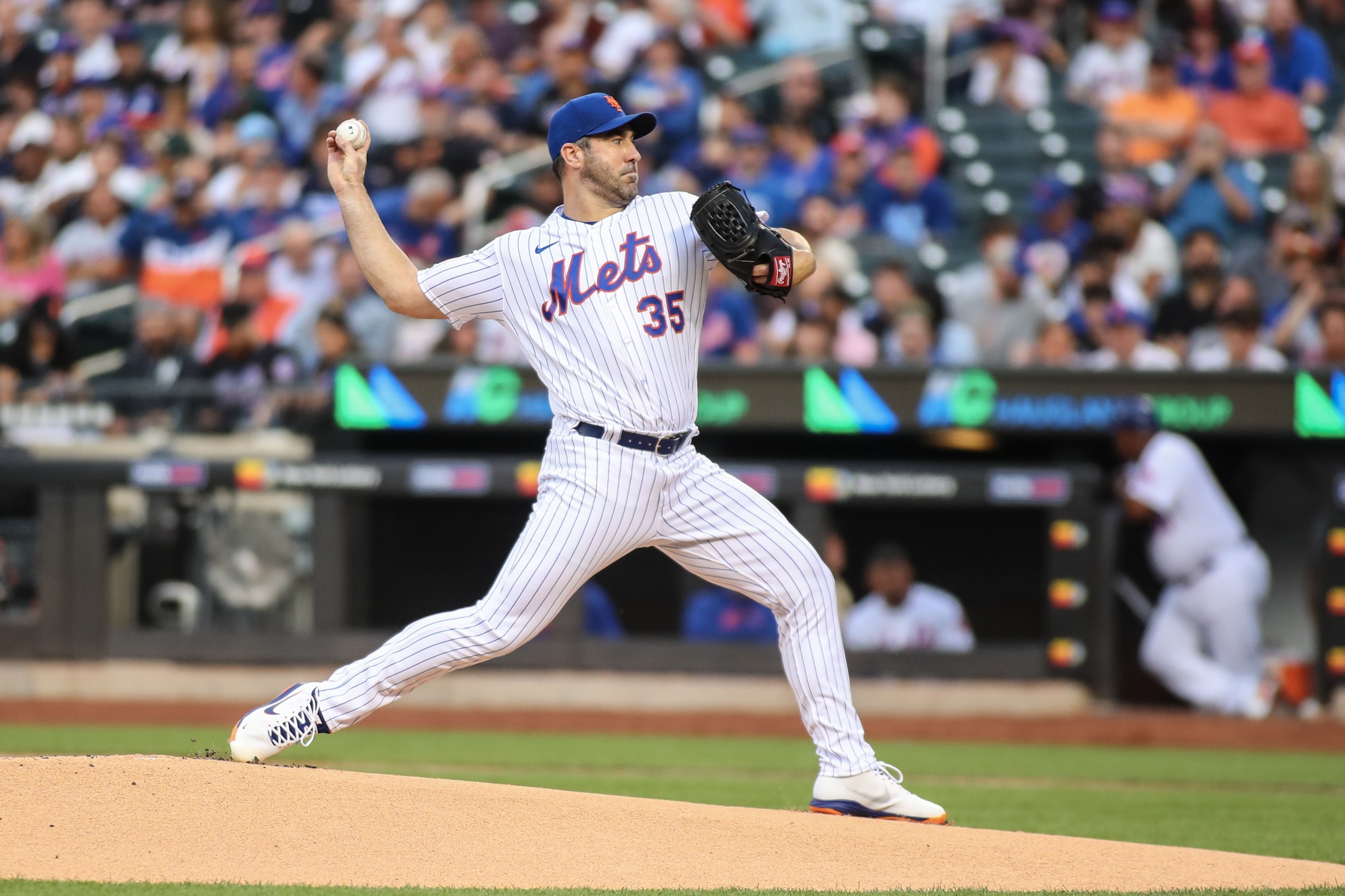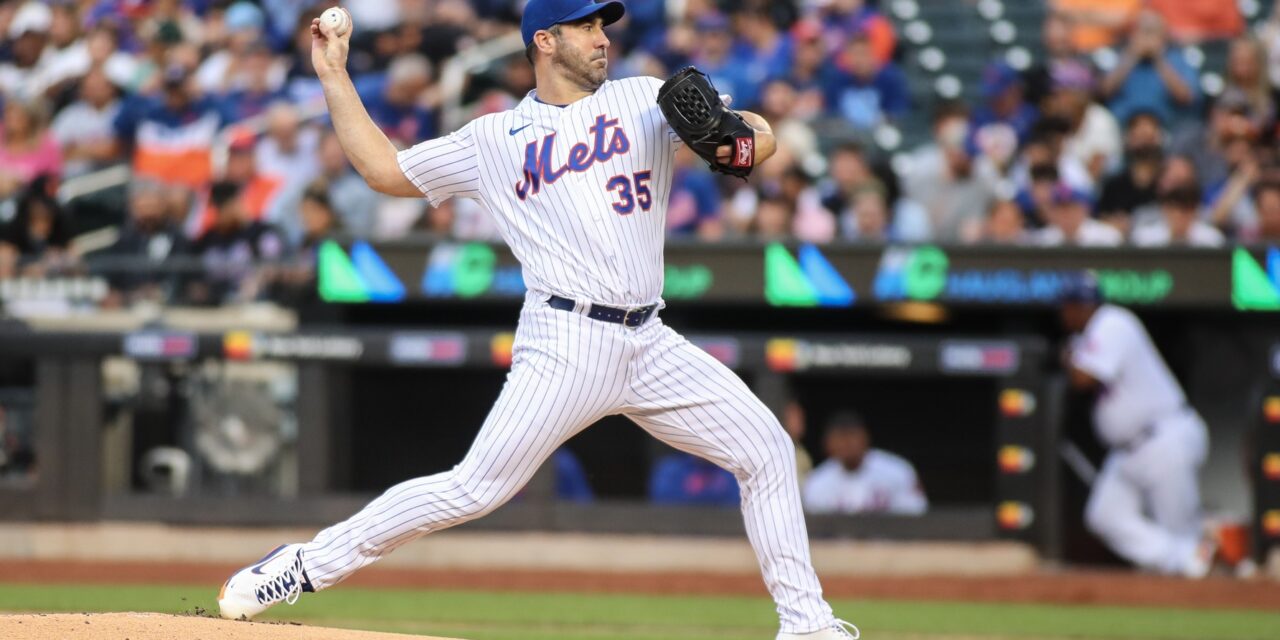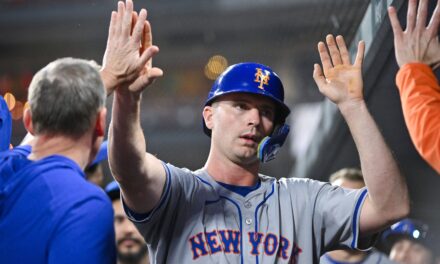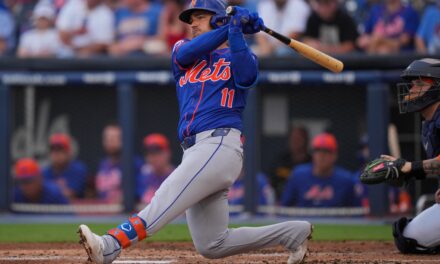
As I returned to action on Saturday night following the Shavuot holiday (for those who remarked upon my absence, look it up) and the Sabbath, I wanted to check whether I would once again be covering a potentially long losing streak against inferior teams. Mission accomplished: the New York Mets won on Thursday and Friday night, alleviating that particular concern.
However, that was seemingly one of the few fears the Mets managed to allay over the weekend. Another series loss to the Colorado Rockies leaves New York once again at the .500 mark and searching for any semblance of consistency. Though hitting at Coors Field is hardly the issue, the other side of the story failed the team in key moments to crush the Mets’ chances of victory.
3 Up
Early Rookie of the Year Candidate?
What more can be said about Francisco Álvarez? Seemingly every day, he does something else to lift the Mets’ offense and the team’s spirits. Even a boneheaded blunder on the basepaths (more on that later) could not erase the three-run homers on back-to-back days. Though the Mets found ways to lose after Álvarez’s heroics, the fact that the catcher continues to produce in all ways may be even more important for the team in the long run than just the final score in each game.
Álvarez’s final line in the series reads 4-for-12 with two homers and six RBIs. He now has seven home runs in 15 May games and is slashing .315/.383/.778/1.161 in that span. All talk of Álvarez being sent down upon the returns of the two Mets’ injured catchers ceased, and not primarily due to the fact that Gary Sánchez was designated for assignment.
Álvarez is sure to cool off at some point. Still, an .885 OPS through 113 plate appearances was likely beyond the Mets’ wildest dreams or expectations for their top prospect. Álvarez has inserted himself into the NL Rookie of the Year conversation and into other discussions about how high his ceiling is at just 21 years old.
Max Seems All the Way Back
Max Scherzer endured a rough start to his season, but his last three starts seem to indicate that he’s settling down. In the difficult setting of Colorado, Scherzer had his longest and most effective outing of the season, a seven-inning, one-run performance with eight strikeouts.
The lone true blip on the radar for Scherzer was a no-doubt solo home run he surrendered to the Rockies’ Ryan McMahon in the second inning. The pitch was a 75-mph curveball that caught too much of the inside part of the plate, and McMahon blasted it 430 feet to center field. Other than that, though, he allowed just one other runner to reach scoring position until his final inning of work. In the seventh, he worked around a one-out single and two-out double, inducing a soft flyout from Ezequiel Tovar to end the threat.
In his last three starts, Scherzer has pitched a combined 18 innings of two-run ball with 11 hits and a 19:3 K/BB ratio. Though the strikeout numbers may not be quite to the level they once were, the decreased WHIP (now 1.13, down from 1.41 at the beginning of the month) means that he doesn’t have to be quite as precise to limit the damage. Scherzer will still give up his home runs—he has allowed six total on the year, or an unsightly 1.55 per nine innings—but if he can contain them to solo homers, he can still be an effective pitcher.
Nimmo Hits In Friendly Confines
The third part of “3 Up” very well could have been the Mets’ comeback from six down in the middle game and their six-run explosion in the second game. However, since both comebacks were ultimately for naught, I chose to highlight another successful hitter in the series, instead.
Brandon Nimmo found a bit of a groove again in the ballpark of his childhood team. Nimmo’s 5-for-10 mark in the series was highlighted by two triples in the series opener; his three walks in the game meant that he reached base all five times at the plate. He added another two hits and a pair of walks in the finale.
The perception that Nimmo has struggled in May is belied by his .286/.352/.446/.798 mark during the month. He did have a significant cooling-off period after his torrid .341/.443/.466/.909 April, but that pace was unsustainable in the long run. The Mets will take Nimmo’s April stat line for the rest of the season, although a slightly higher on-base percentage would be preferable based on the center fielder’s career norms.
Hitting in front of friends and family has to feel good for Nimmo, even in the generous space of Coors Field.
3 Down
The Other Starters Implode
The goodwill of Scherzer’s positive start was wiped out by back-to-back stinkers from Justin Verlander and Tylor Megill. Verlander could not build upon his gem against Cleveland in his previous start, as his final stat line was eerily similar to the one from the outing before that against the Rays: five innings, nine hits, six earned runs, one walk, and just two strikeouts. The primary difference was that Verlander was rocked despite not surrendering a home run.
The game started out well for Verlander, as he retired the Rockies in order in the first inning on just eight pitches. However, after struck out McMahon in the second, three straight singles followed by a double, a walk, and another double put Colorado ahead 4-0. A sacrifice fly made the score 5-0 before Verlander could escape the inning. He gave up another run on two singles and a double in the third. By the time he finished the fifth, he was at just 79 pitches, but Buck Showalter had seen enough.
It remains early to be truly concerned about Verlander, but a second implosion in three games gives some pause. It’s particularly notable that he was hit so hard despite not surrendering the long ball, as that was a big part of what previously dogged him (five homers allowed and a 0.92 WHIP entering this game). Coors Field is the place where pitchers go to die, but an ace is still supposed to be an ace.
The Mets are going to need Verlander to find his consistency for them to go anywhere, especially with the difficulties of the rest of the rotation, including Megill. The 27-year-old has followed up his encouraging start against Tampa with two consecutive clunkers. In both starts, unearned runs did him no favors, but he had done more than enough to put himself in those holes.
Against Colorado, Megill labored through the first inning, giving up two consecutive singles after he had retired the first two batters. Though he got through the inning unscathed, his pitch count was at 25 after one, a problem that has dogged Megill throughout his brief major league career.
In the second inning, Megill danced around another two singles, aided by his pickoff of Harold Castro. The Rockies broke through in the third, though, following Megill’s dropped ball. The next two batters were retired, which would have meant a one-two-three inning if not for the miscue. Colorado took advantage, as a walk and back-to-back singles brought in two runs.
After the Mets’ offense went to work in the top of the fourth, putting up six runs, Megill simply could not hold the 6-2 lead he had been spotted. Once again, the trouble began with two outs. Two singles and a walk loaded the bases for McMahon, who greeted Megill with a bases-clearing double to bring the game within a run. Randal Grichuk then doubled to knot the score.
Megill’s final line in the game read 10 hits, six runs (four earned), two walks, and three strikeouts in four innings of work. The fact that two of the runs were unearned does not mitigate the 13 earned baserunners that Megill allowed. He now has a 1.59 WHIP on the season. When combined with his 1.44 HR/9 allowed, it’s unsurprising that he has a 4.67 ERA and a 5.98 xERA.
If Verlander had pitched at the level the Mets expected, they could have handled Megill’s no-show. The problem is that the team is often relying on Megill to stanch the bleeding after poor performances from other starters. He has shown throughout this season that he is not that guy.
Bullpen Can’t Back Offense
Despite the awful starts from Verlander and Megill, the Mets had a strong chance to win both of those games. Each one was the result of a comeback highlighted by a three-run homer from Álvarez. Although Megill was the one who let Colorado tie the game after the Mets had taken the lead, both times it was the bullpen that blew it after the comeback.
In the middle game of the series, the Mets had actually taken a 7-6 lead in the seventh on an RBI single by Starling Marte. However, in the bottom of the inning, Jeff Brigham promptly gave it back on a double by Elias Díaz and a two-run homer by McMahon. Two more runs allowed by Drew Smith in the eighth gave the Rockies some breathing room, and the Mets could not find one more magical comeback in them.
In the finale, Álvarez’s homer capped a six-run fourth inning. Even after Megill gave the runs right back to make the game 6-6, there was still a chance for a reset. However, Stephen Nogosek, the Mets’ de facto long reliever, was blasted in a five-run fifth for Colorado, putting the game virtually out of reach at 11-6. Although the Mets tried to claw their way back in the ninth, it was another game in which the bullpen betrayed the offense after the hitting had bailed out the starting pitching.
Though the Mets’ bullpen has not been their primary issue this season, big outs in middle relief seem to be at a high premium. Just keeping the game within one or two runs in that situation could have sufficed in the bandbox of Coors Field. Instead, Nogosek gave up the one big inning that demoralized the team and put a comeback in the unlikely category.
Some More Baserunning Mistakes
Considering that the starting pitchers and relievers were combined in the last two sections and the offense played well as a whole, a third in the “3 Down” section was not easy to find. There were two questionable plays made on the basepaths in the series, though. One deserves clear mention, while the other was debatable but still finds its way into this section.
As well as Álvarez played in the series, he made a rookie mistake in the middle game. With the Mets trailing 5-0 in the third inning, the catcher led off with a line drive in the gap, which had him thinking three. Although his slide beat the throw, he raised his hand off the bag too early to celebrate. The Rockies challenged that Álvarez was tagged out, and the call on the field was reversed. The Mets lost the opportunity to start a comeback because the rookie let his emotions cost the team a runner in scoring position.
Although the idea of challenging such a call was not in the spirit of the replay rules, it was a seemingly inevitable side effect from the moment it was put into place in 2014. Hitters and baserunners are coached to keep their hand on the bag at all times following a slide, just as fielders are told to keep applying the tag until time is called. In his rush to celebrate a rare feat for a catcher, Álvarez got caught napping. His later three-run homer eliminated the effects of the error; still, it is a baserunning blunder a team does not want to see for the entire season.
In the final game of the series, after Megill allowed the Rockies to tie the game at six in the fourth, Pete Alonso led off the next inning with a triple. (The fact that Álvarez and Alonso, who are significantly below-average in average sprint speed, were both able to record triples says something about the confines of Coors Field.) Mark Vientos then hit a ground ball to third, and Alonso broke to the plate on contact. McMahon fired a perfect throw home to nab Alonso.
It could be argued (and the Rockies’ broadcast did) that Alonso thought the Rockies were conceding the run because McMahon was playing back. Ultimately, it was a great play by the fielder, and generally one to which you tip your cap. However, it’s particularly detrimental for a team to lose a runner on third base in exchange for one on first. Perhaps Alonso could have curbed his aggressiveness on a ground ball to the corner infielder to give the Mets two more bites at the apple. However, with the team’s track record with runners in scoring position this season, pushing the envelope may have been warranted.
This is not meant to be too harsh on Alonso; it was a tie game and his reasoning wasn’t too unsound. It’s more notable just for the fact that the bullpen gave away the game in the bottom of the inning, making this play one of the “what-if” questions of the series.
The Mets head home for an intradivisional matchup with the Phillies on Tuesday (7:10 p.m. ET).















